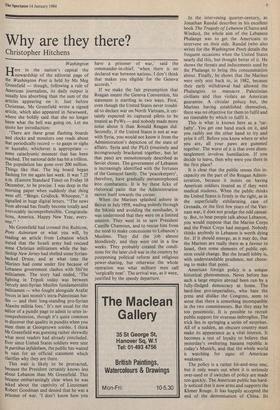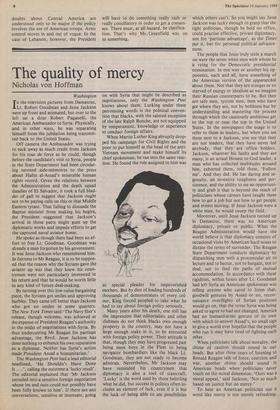Why are they there?
Christopher Hitchens
Washington
Here in the nation's capital the stewardship of the editorial page of the Washington Post is held by Ms Meg Greenfield — though, following a rule of American journalism, its daily output is usually less absorbing than the sum of the articles appearing on it. Just before Christmas, Ms Greenfield wrote a signed article, which also appeared in Newsweek, where she boldly said that she no longer knew what the hell was going on. Let me quote her introduction: `There are these great flashing boards and clocks and monitors one reads about that periodically record — to gasps or sighs or huzzahs, whichever is appropriate some cataclysmic moment that has been reached. The national debt has hit a trillion. The population has gone over 200 million. Things like that. The big board began flashing for me again last week. It was 7.25 a.m. (Eastern Standard Time) on Friday 16 December, to be precise. I was deep in the Morning paper when suddenly that thing went off. "Bingo. Gridlock. Whoopee," it signalled in huge digital letters. "The news from abroad has finally become totally and irrevocably incomprehensible. Congratula- tions, America. Happy New Year, every- one." '
Ms Greenfield had crossed this Rubicon, Pons Asinorum or what you will, by reading an article from Lebanon which stated that the Israeli army had rescued some Christian militiamen while the bat- tleship New Jersey had shelled some Syrian- backed Druze, and at what time the Marines had come under fire because of Lebanese government clashes with Shi'ite Militiamen, The story had ended, 'The fighting in Tripoli today was between fiercely anti-Syrian Muslim fundamentalist Militiamen — who fought alongside Arafat forces in last month's intra-Palestinian bat- tles — and their long-standing pro-Syrian Alawite militia foes.' It's not usual for the editor of a pundit page to admit to utter in- comprehension, though it's quite common to discover that quality in pundits when you meet them at Georgetown soirees. I think Ms Greenfield was guessing rather shrewdly what most readers had already concluded. Ever since United States soldiers were sent in partibus infidelittm, the public has waited In vain for an official statement which clarifies why they are there.
This wait is likely to be protracted, because the President certainly knows less about Lebanon than Ms Greenfield. This became embarrassingly clear when he was asked about the captivity of Lieutenant Robert Goodman and denied that he was a Prisoner of war. 'I don't know how you have a prisoner of war,' said the commander-in-chief, 'when there is no declared war between nations. I don't think that makes you eligible for the Geneva accords.'
If we make the fair presumption that Reagan meant the Geneva Convention, his statement is startling in two ways. First, even though the United States never troubl- ed to declare war on North Vietnam, it cer- tainly expected its captured pilots to be treated as PoWs — and nobody made more noise about it than Ronald Reagan did. Secondly, if the United States is not at war with Syria, you would not know it from the Administration's depiction of the state of affairs. Syria and the PLO (routinely and incongruously bracketed together, but let that pass) are monotonously described as Soviet clones. The government of Lebanon is increasingly identified with the fortunes of the Gemayel family. The 'peacekeepers', therefore, have gradually metamorphosed into combatants. It is by these licks of rhetorical paint that the Administration moves itself towards the corner.
When the Marines splashed ashore in Beirut in July 1958, wading politely through the bikinis and avoiding the sunshades, it was understood that they were on a limited mission. They went in to save President Camille Chamoun, and to rescue him from the need to make concessions to Lebanon's Muslims. They did the job almost bloodlessly, and they were out in a few weeks. They probably created the condi- tions for the later civil war in the country by postponing political reform and religious power-sharing, but otherwise the whole operation was what military men call 'surgically neat'. The arrival was, as it were, justified by the speedy departure. In the intervening quarter-century, as Jonathan Randal describes in his excellent book The Tragedy of Lebanon (Chatto and Windus), the whole aim of the Lebanese Phalange was to get the Americans to intervene on their side. Randal (who also writes for the Washington Post) details the frequent occasions when the United States nearly did this, but thought better of it. He shows the threats and inducements used by the Phalange to bring this consummation about. Finally, he shows that the Marines were only sent back in, in 1982, because their early withdrawal had allowed the Phalangists to massacre Palestinian civilians and thus violate an American guarantee. A circular polucy but, the Marines having established themselves, there was no objective for them to fulfil and no timetable by which to fulfil it.
This is what is known here as a 'tar- baby'. You get one hand stuck on it, and you rashly use the other hand to try and prise it off. Before you know where or who you are, all your paws are gummed together. The worst of it is that even disen- tanglement involves humiliation. If you decide to leave, then why were you there in the first place?
It is clear that the public senses this in- capacity on the part of the Reagan Admin- istration, because it insists on having American soldiers treated as if they were medical students. When the public thinks the United States is firmly in the right, as in the superficially exhilarating case of Grenada, or the first few years of the Viet- nam war, it does not grudge the odd casual- ty. But, to hear people talk about Lebanon, you would suppose that the Marine Corps and the Peace Corps had merged. Nobody thinks anybody in Lebanon is worth dying for. If it should emerge, as it may do, that the Marines are really there as a favour to Israel, then some elements of public opi- nion could change. But the Israeli lobby is, with understandable prudence, not choos- ing to make that point.
American foreign policy is a unique historical phenomenon. Never before has such a large empire abroad been run by a fully-fledged democracy at home. The hard-line pro-imperialists, who hate the press and dislike the Congress, seem to sense that there is something incompatible in the two commitments. But they may be too pessimistic. It is possible to recruit public support for overseas imbroglios. The trick lies in springing a series of surprises. All of a sudden, an obscure country must make its appearance as a vital interest. It becomes a test of loyalty to believe that yesterday's sweltering banana republic is today's Munich, and that the whole world is watching for signs of American weakness.
The policy is a rather hit-and-miss one, but it only wears out when it is seriously over-used or if switches of policy are made too quickly. The American public has hard- ly noticed that it now arms and supports the Khmer Rouge. It has happily accepted the end of the demonisation of China. Its doubts about Central America are understood only to be major if the policy involves the use of American troops. Arms control moves in and out of vogue. In the case of Lebanon, however, the President will have to do something really rash or really conciliatory in order to get a consen- sus. There must, at all hazard, be clarifica- tion. That's why Ms +, Greenfield was on to something.







































 Previous page
Previous page